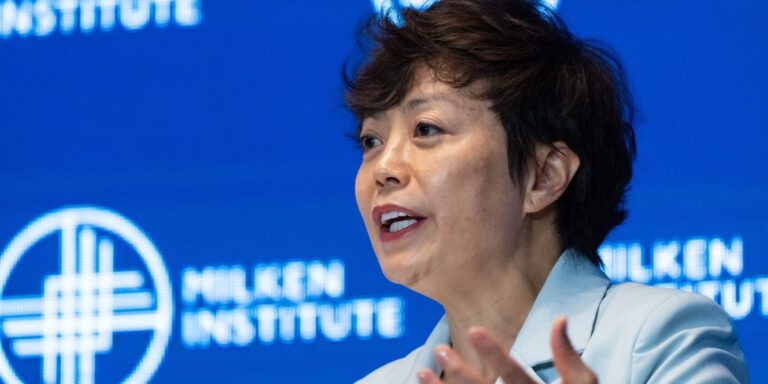
BYD, the Chinese electric vehicle giant backed by Warren Buffett’s Berkshire Hathaway, has global ambitions by expanding its presence in countries like Japan, ThailandAnd Mexico to sell its ultra-affordable electric vehicles around the world. But one market is visibly absent: the United States.
The U.S. electric vehicle market is in “a very confusing phase” due to slowing consumer adoption, BYD Americas CEO Stella Li said. said Monday. “Electric vehicle penetration in the United States has actually fallen,” she explained.
Speaking at the Milken Institute Global Conference in a session moderated by The wealth Diane Brady and Li reiterated that the Chinese electric vehicle giant has “no plans to sell to the United States,” continued similar comments made in February.
Washington is trying to remove China from the electric vehicle supply chain, with recent legislation denying tax credits for vehicles using Chinese components like batteries. On Monday, Li said geopolitics had a “big impact” on BYD. “The United States is becoming a very protective market,” she said.
In March, President Joe Biden warned that Chinese cars could here a national security risk, because on-board software could collect environmental data and transmit it to Beijing.
Meanwhile, former President Donald Trump threatened to slap a rate up to 100% on imports of Chinese vehicles if he is elected in November. The Trump administration previously increased tariffs on Chinese car imports to 27.5%.
Monday, Li expressed his hope that “everything will return to normal” after the US elections in November, as people become “more solid, thinking about the future solution here”.
“Not fair”
Chinese automakers aren’t the only ones attracting attention.
Last year, members of Congress critical a planned joint venture between Ford and Chinese battery giant CATL in Michigan, alleging it could lead to a flow of money from the U.S. government to a Chinese company.
Congress is also taking into account the legislation it would prevent Chinese biotech companies from working with federally funded medical providers.
Civil servants are also would have been concerned on the use of Chinese cranes at U.S. ports, fearing that such machines could send data back to China. In February, the Biden administration pledged $20 billion in spending on port infrastructure, including domestic crane production.
Monday, Li complained that it is “not fair” that Chinese companies are automatically seen as working hand in hand with the Chinese government.
The BYD executive highlighted the current debate over TikTok, owned by Chinese technology company ByteDance. In April, the Biden administration signed a law which orders ByteDance to sell TikTok within nine months under threat of a ban. Tic Tac This week, the United States sued to block a bansetting up a fight for the First Amendment.
Li questioned why TikTok required such scrutiny. “Even President Biden uses TikTok, so why do they have to ban it? »
BYD Global Expansion
BYD, which sells both battery electric vehicles and plug-in hybrids, is from afar the largest seller of “new energy vehicles” in China. The company is now targeting overseas markets as part of an aggressive expansion drive. BYD is building manufacturing facilities at Hungary, Thailand, IndonesiaAnd Brazil.
Cheap Chinese electric vehicles from companies like BYD are now sparking a backlash. Last October, the European Union launched an anti-subsidy investigation into electric vehicles made in China, including those made by BYD. The investigation could lead to prices on Chinese car imports.
For its part, BYD argues that its low prices are due to “management efficiency» and investments in technology.
Monday, Li suggested that the United States should adopt China’s “core” electric vehicle supply chain. “They will bring the best technology to the country,” she continued.
U.S. officials are learning they can’t completely exclude China from the electric vehicle supply chain. Last week, the United States agreed to allow automakers to use Chinese graphite, a key material for batteries, and always qualified for tax credits.


